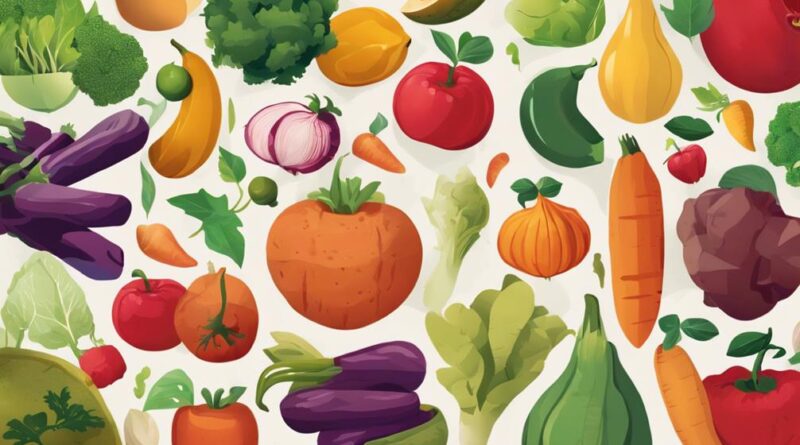Unlocking Global Benefits of Organic Food Markets
Unlock the economic advantages of the $320.5 billion global organic food market, driven by health and environmental concerns. Organic farming benefits soil health, biodiversity, and consumer health. Governments support market growth through regulations. Trade agreements expand market access, and certification standards build consumer trust. Challenges like certification labels are being addressed through collaboration and technological advancements. Cultural influences impact market adoption. Tapping into this market offers opportunities for sustainable agriculture, nutritional benefits, and economic growth. Explore how conscious choices and regulations are reshaping the organic food market landscape for sustainability and well-being.
Growing Demand for Organic Products
With an increasing awareness of health and environmental concerns, consumers are driving a significant surge in the demand for organic products. Consumer preferences for organic goods have been steadily increasing over the past decade, leading to substantial market growth in the organic food sector. According to recent market research data, the global organic food market is projected to reach $320.5 billion by 2025, growing at a CAGR of 14.7%.
Consumers are increasingly choosing organic products due to their perceived health benefits and environmental sustainability. A study conducted by a leading consumer research firm found that 67% of consumers prioritize buying organic food due to health reasons, while 55% do so because of environmental concerns. This shift in consumer preferences has had a profound impact on the market, with organic food sales outpacing conventional food sales in many regions.
Governments and policymakers are also taking note of this trend and implementing regulations to support the growth of the organic market. Initiatives such as organic certification programs, subsidies for organic farmers, and awareness campaigns are being introduced to encourage more sustainable agricultural practices and meet the rising demand for organic products. As consumer preferences continue to drive market growth, the organic food sector is poised for further expansion in the coming years.
Environmental Sustainability and Organic Markets
The increasing demand for organic products is closely linked to the growing emphasis on environmental sustainability in global markets. As consumers become more aware of the impact of their choices on the environment, there's a shift towards supporting agricultural practices that prioritize sustainability. Organic farming plays a crucial role in promoting environmental sustainability through practices that benefit soil health and biodiversity conservation.
Organic farming practices focus on maintaining and improving soil health. By avoiding the use of synthetic pesticides and fertilizers, organic farmers help preserve the natural composition of the soil. Healthy soils are essential for sustainable agriculture as they support plant growth, retain water, and sequester carbon. By choosing organic products, consumers contribute to the preservation of soil health, ensuring the productivity of agricultural land for future generations.
Furthermore, organic farming promotes biodiversity conservation. The absence of synthetic chemicals in organic agriculture creates a safer environment for beneficial insects, birds, and other wildlife. By cultivating diverse ecosystems within and around organic farms, biodiversity is enhanced, contributing to natural pest control and pollination. Supporting organic markets helps protect and promote biodiversity, which is essential for the resilience of ecosystems and the sustainability of food production.
Health Benefits Driving Global Organic Trends
Promoting organic food consumption globally hinges on recognizing the compelling health benefits that drive current organic market trends. The nutritional advantages of organic foods are a key factor in shaping consumer preferences worldwide. Studies have shown that organic fruits and vegetables contain higher levels of antioxidants and essential nutrients compared to conventionally grown produce. These nutritional benefits not only contribute to overall health but also play a significant role in preventing chronic diseases.
Consumers are increasingly drawn to organic products due to concerns about pesticide residues and the potential health risks associated with them. Choosing organic foods reduces exposure to harmful chemicals, offering a safer and healthier alternative for individuals and families. This shift in consumer behavior towards prioritizing health and wellness is driving the growth of the global organic food market.
Governments and policymakers are recognizing the importance of promoting organic agriculture to improve public health outcomes. By incentivizing organic farming practices and supporting organic food producers, countries can enhance food security and encourage sustainable agricultural systems. Emphasizing the health benefits of organic foods in public health campaigns can further raise awareness and increase consumer demand for organic products.
Economic Opportunities in Organic Food Trade
Exploring the economic landscape of organic food trade reveals a wealth of opportunities for sustainable growth and market expansion. Trade agreements play a crucial role in shaping the global organic food market. By fostering international cooperation and reducing trade barriers, these agreements create a conducive environment for organic food producers to access new markets and increase their exports. For instance, the European Union's trade agreements with various countries have facilitated the export of organic products, leading to increased trade volumes and economic benefits for both parties involved.
Market research is another fundamental aspect that drives economic opportunities in organic food trade. Understanding consumer preferences, market trends, and demand patterns is essential for organic food producers to tailor their products effectively and gain a competitive edge in the market. Through market research, businesses can identify potential growth markets, develop targeted marketing strategies, and optimize their production processes to meet the evolving needs of consumers.
Organic Certification Standards and Global Markets
Analyzing organic certification standards' impact on global markets reveals essential insights into market dynamics and consumer preferences. Organic farming practices are at the core of these standards, ensuring that products are grown without synthetic pesticides or fertilizers. This commitment to sustainability resonates with consumers worldwide, driving the demand for organic products in international trade.
Market differentiation plays a crucial role in the success of organic food markets. Certification allows organic products to stand out from conventional ones, providing consumers with a clear choice. This differentiation isn't just about the product itself but also about the values and practices that consumers associate with organic certification.
Consumer trust is a key factor in the growth of organic food markets globally. Certification standards build trust by providing assurance that products meet specific criteria regarding production methods and ingredient quality. This trust is essential for consumers who seek transparency and reliability in the products they purchase.
As organic certification standards continue to evolve and adapt to changing market dynamics, they play a vital role in shaping the future of organic food trade. By upholding high standards for organic farming practices and fostering consumer trust, these standards pave the way for the continued growth and globalization of the organic market.
Challenges and Solutions in Organic Market Globalization
To understand the expansion of organic food markets on a global scale, it's imperative to address the challenges and implement effective solutions in organic market globalization. One of the key challenges in the globalization of organic markets is the complexity of the supply chain. Organic products often require separate supply chains to ensure the integrity of the organic certification standards. This can lead to higher costs and inefficiencies in the distribution process, hindering market expansion.
Moreover, differing organic certification standards across countries pose a significant barrier to the smooth global trade of organic products. Without a harmonized set of standards, organic producers face challenges in accessing new markets and consumers may be confused by the varying certification labels.
In response to these challenges, policymakers and industry stakeholders must work towards creating more streamlined supply chains for organic products. This could involve investing in infrastructure to support the storage and transportation of organic goods more efficiently. Additionally, efforts to harmonize organic certification standards globally would facilitate market expansion by reducing trade barriers and increasing consumer trust in organic products.
Technological Advancements in Organic Food Distribution

Technological advancements have revolutionized the distribution of organic food, enhancing efficiency and sustainability in the global market. The implementation of blockchain traceability has been a game-changer in ensuring transparency and accountability throughout the supply chain. This technology allows consumers to track the journey of their food products from farm to table, promoting trust and confidence in the organic food market.
Automated packaging solutions have also played a significant role in streamlining the distribution process. By utilizing automated systems, companies can optimize packaging procedures, reduce waste, and minimize the environmental impact of packaging materials. This not only increases operational efficiency but also aligns with the sustainability goals of the organic food industry.
The integration of these technological advancements hasn't only improved the logistics of organic food distribution but has also contributed to the overall growth of the global organic market. With blockchain traceability ensuring quality and authenticity, and automated packaging solutions enhancing efficiency, organic food producers and distributors are better equipped to meet the increasing demand for organic products worldwide.
As the organic market continues to expand, leveraging technological innovations will be crucial in driving further growth and establishing a more sustainable food system. By embracing these advancements, stakeholders can unlock the full potential of organic food markets on a global scale.
Cultural Influences on Global Organic Market Adoption
Cultural influences significantly shape the adoption of organic food markets on a global scale, impacting consumer preferences and market trends. Traditional practices deeply rooted in various cultures play a pivotal role in determining the acceptance and growth of organic food markets worldwide. For instance, in countries where traditional farming methods are highly valued, the shift towards organic farming and consumption is often more readily embraced.
Consumer preferences also play a crucial role in the global organic market adoption. Preferences for natural, healthier food options that align with cultural beliefs and practices drive the demand for organic products. This is evident in regions where organic food isn't just a trend but a way of life, reflecting cultural norms and values surrounding food production and consumption.
Understanding and respecting these cultural influences is essential for policymakers and businesses aiming to further promote organic food markets globally. Strategies that take into account traditional practices and consumer preferences are more likely to succeed in expanding the organic market share. By aligning initiatives with cultural values and preferences, stakeholders can foster a more sustainable and inclusive organic food market that resonates with diverse populations worldwide.
Conclusion
In conclusion, the global organic food market presents a unique opportunity for economic growth, environmental sustainability, and improved health outcomes.
With increasing demand for organic products, there's a clear need for standardized certification processes and technological advancements to support market globalization.
By addressing challenges and capitalizing on the benefits of organic food trade, countries can unlock the full potential of this growing industry for the betterment of society and the planet.
